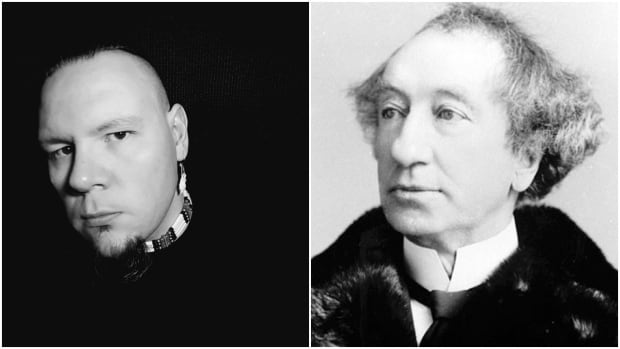A Saskatchewan author who legally changed his name from one resembling a former prime minister is seeing his books published after 15 years of rejection.
After more than 200 rejection letters from publishers, John Brady McDonald has had three of his works published in the last two years.
That includes his most recent book, Electricity Slides, his first under his new name.
McDonald, a member of the Muskeg Lake Cree Nation from Paddockwood, Sask., was named John A. McDonald for the first 40 years of his life — but legally changed his middle name of Adrian last year after name-change fees were waived for residential school survivors.
Sir John A. Macdonald, Canada’s first prime minister, played a key role in establishing the residential school system.
“Not only as a residential school survivor, but as an Indigenous person, to carry that name for so long, it was an albatross around my neck. It was a painful name to carry,” he said.
“It feels like a thousand-pound weight off my shoulders.”
McDonald was forced to attend the Prince Albert Indian Student Residence from 1984 to 1989.
He told CBC’s The Morning Edition host Stefani Langenegger that his name was a stumbling block when he was trying to share stories of what had happened to him in residential school, or to advocate for those who are no longer alive to tell their stories.
“People would either assume that I was kind of being a smart-alec and say, ‘Oh, you’re an Indigenous survivor with that name?’ Or it was causing pain for people — myself, in particular,” he said.
He said while it has been very empowering to see his new name in print, there are those who have told him they will continue to use his dead name.
“The tough part has always been those individuals who say, ‘Well, you know, I’ve always known you as this, I’m just going to keep calling you this,'” he said.
McDonald said he settled on his new middle name to honour his grandfather, the late Métis leader Jim Brady.
As for his recent success as an author, McDonald said he has benefited from a resurgence in Indigenous storytelling.
He said publishers got the message over the last five to 10 years that Indigenous stories needed to be told and that there is demand for those stories.
“For a long time, when Indigenous books were published, we were a niche,” he said. “I hate to say it, but there were some publishers out there that published Indigenous books solely based on a sense of tokenism or to check off a PR box.”
12:35Sask. author and residential school survivor publishes three new books and has new legal name
John Brady McDonald, Saskatchewan author and residential school survivor, has a new name and newfound success. 12:35
McDonald has actually published four books, with the first —a book of poetry — being released in 2004 before the years of rejection.
Those 15 years of trying to get a second book published had a lot of disappointments, with many visits to the post office with bound manuscripts being sent off to publishers and “a little fortune” spent on postage, he said.
McDonald said there were a lot of times when he wanted to give up but didn’t allow himself to.
“I think the biggest reason is if I were to give up, I would have proven a lot of people in my past right who told me that because I was an urban Indigenous kid from the West Flat of Prince Albert that grew up in a residential school, that I wasn’t going to do anything, that I wasn’t going to go anywhere, that there was no future for me,” he said.
He said he also wanted to set an example for any young people who were watching.
“If I were to give up, what lesson is that going to teach them about chasing their goals, achieving their dreams and trying to overcome the limitations that are put on them by some members of society?”
For all the latest Entertainment News Click Here
For the latest news and updates, follow us on Google News.

